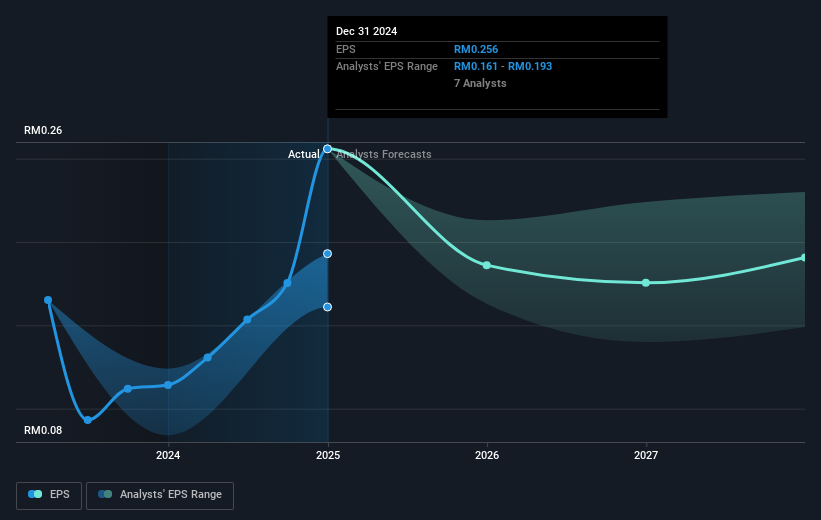The three-year shareholder returns and company earnings persist lower as Hap Seng Plantations Holdings Berhad (KLSE:HSPLANT) stock falls a further 12% in past week

For many investors, the main point of stock picking is to generate higher returns than the overall market. But if you try your hand at stock picking, you risk returning less than the market. Unfortunately, that's been the case for longer term Hap Seng Plantations Holdings Berhad (KLSE:HSPLANT) shareholders, since the share price is down 44% in the last three years, falling well short of the market decline of around 2.0%. Even worse, it's down 15% in about a month, which isn't fun at all. We do note, however, that the broader market is down 7.1% in that period, and this may have weighed on the share price.
If the past week is anything to go by, investor sentiment for Hap Seng Plantations Holdings Berhad isn't positive, so let's see if there's a mismatch between fundamentals and the share price.
While the efficient markets hypothesis continues to be taught by some, it has been proven that markets are over-reactive dynamic systems, and investors are not always rational. One imperfect but simple way to consider how the market perception of a company has shifted is to compare the change in the earnings per share (EPS) with the share price movement.
Hap Seng Plantations Holdings Berhad saw its EPS decline at a compound rate of 3.0% per year, over the last three years. The share price decline of 18% is actually steeper than the EPS slippage. So it's likely that the EPS decline has disappointed the market, leaving investors hesitant to buy. This increased caution is also evident in the rather low P/E ratio, which is sitting at 6.76.
The graphic below depicts how EPS has changed over time (unveil the exact values by clicking on the image).

We know that Hap Seng Plantations Holdings Berhad has improved its bottom line lately, but is it going to grow revenue? Check if analysts think Hap Seng Plantations Holdings Berhad will grow revenue in the future.
What About Dividends?
It is important to consider the total shareholder return, as well as the share price return, for any given stock. Whereas the share price return only reflects the change in the share price, the TSR includes the value of dividends (assuming they were reinvested) and the benefit of any discounted capital raising or spin-off. It's fair to say that the TSR gives a more complete picture for stocks that pay a dividend. We note that for Hap Seng Plantations Holdings Berhad the TSR over the last 3 years was -35%, which is better than the share price return mentioned above. And there's no prize for guessing that the dividend payments largely explain the divergence!
A Different Perspective
While it's never nice to take a loss, Hap Seng Plantations Holdings Berhad shareholders can take comfort that , including dividends,their trailing twelve month loss of 3.5% wasn't as bad as the market loss of around 7.5%. Longer term investors wouldn't be so upset, since they would have made 10%, each year, over five years. It could be that the business is just facing some short term problems, but shareholders should keep a close eye on the fundamentals. While it is well worth considering the different impacts that market conditions can have on the share price, there are other factors that are even more important. For example, we've discovered 2 warning signs for Hap Seng Plantations Holdings Berhad (1 makes us a bit uncomfortable!) that you should be aware of before investing here.
We will like Hap Seng Plantations Holdings Berhad better if we see some big insider buys. While we wait, check out this free list of undervalued stocks (mostly small caps) with considerable, recent, insider buying.
Please note, the market returns quoted in this article reflect the market weighted average returns of stocks that currently trade on Malaysian exchanges.
If you're looking to trade Hap Seng Plantations Holdings Berhad, open an account with the lowest-cost platform trusted by professionals, Interactive Brokers.
With clients in over 200 countries and territories, and access to 160 markets, IBKR lets you trade stocks, options, futures, forex, bonds and funds from a single integrated account.
Enjoy no hidden fees, no account minimums, and FX conversion rates as low as 0.03%, far better than what most brokers offer.
Sponsored ContentValuation is complex, but we're here to simplify it.
Discover if Hap Seng Plantations Holdings Berhad might be undervalued or overvalued with our detailed analysis, featuring fair value estimates, potential risks, dividends, insider trades, and its financial condition.
Access Free AnalysisHave feedback on this article? Concerned about the content? Get in touch with us directly. Alternatively, email editorial-team (at) simplywallst.com.
This article by Simply Wall St is general in nature. We provide commentary based on historical data and analyst forecasts only using an unbiased methodology and our articles are not intended to be financial advice. It does not constitute a recommendation to buy or sell any stock, and does not take account of your objectives, or your financial situation. We aim to bring you long-term focused analysis driven by fundamental data. Note that our analysis may not factor in the latest price-sensitive company announcements or qualitative material. Simply Wall St has no position in any stocks mentioned.
About KLSE:HSPLANT
Hap Seng Plantations Holdings Berhad
An investment holding company, operates as an oil palm plantation company in Malaysia.
Flawless balance sheet, undervalued and pays a dividend.
Similar Companies
Market Insights
Community Narratives



